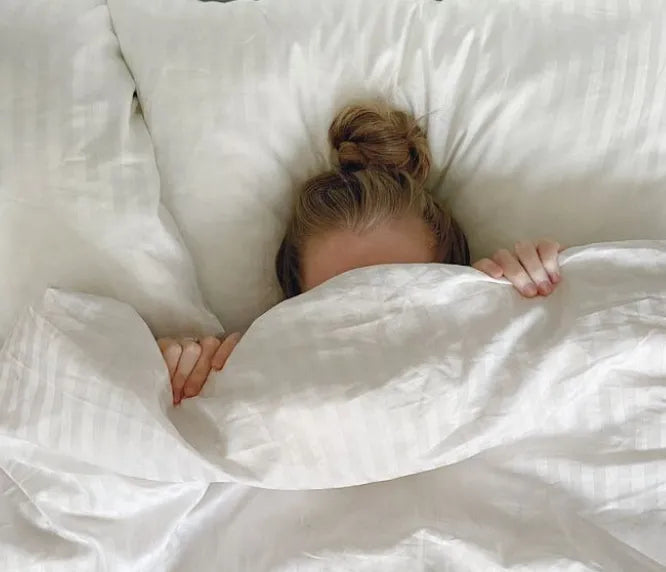Hi, I’m Hilary. Over the years, I’ve worked with so many women navigating menopause, and one of the most common questions I hear is, “Can something as simple as a tea actually help me sleep?” If you’ve ever struggled through a sleepless night filled with tossing, turning, and hot flashes, you might be sceptical.
The truth is, the right natural sleep tea can be a powerful ally in managing menopause insomnia. With hormone-friendly ingredients and calming properties, teas like Our Calming Herbata are designed to work with your body to ease stress, regulate sleep, and promote relaxation. Let’s dive into how a sleep tea can help and what to look for in the perfect cup.
What Causes Menopause Insomnia?
Menopause disrupts sleep in several ways, all tied to hormonal changes:
1. Night Sweats and Hot Flashes
As oestrogen levels decline, your body struggles to regulate temperature, leading to sudden heat surges that wake you up.
2. Increased Stress and Cortisol
Hormonal changes often heighten stress and anxiety, increasing cortisol, the “stress hormone,” which keeps your body alert when it should be winding down.
3. Declining Progesterone
Known as the “calming hormone,” progesterone helps promote restful sleep. Its decline during menopause often results in restlessness and lighter sleep cycles.
How Can a Sleep Tea Help?
A carefully formulated sleep tea addresses the root causes of menopause insomnia, working to calm your mind, support hormonal balance, and ease physical discomforts like hot flashes. Our Calming Tea combines natural ingredients that are known to promote relaxation and restorative sleep:
-
Oat Straw: A gentle nerve tonic that helps calm stress and tension, allowing your mind to relax.
-
Lavender: Known for its soothing properties, lavender helps reduce anxiety and improve sleep quality.
-
Chamomile: A traditional sleep aid, chamomile is excellent for reducing anxiety and promoting deep sleep.
-
Passionflower and Lemon Balm: These herbs are known to stabilise mood, reduce hormonal restlessness, and help your body transition into a more relaxed state.
Why Choose a Natural Sleep Remedy Like Tea?
Unlike synthetic sleep aids, which may leave you groggy or dependent, a herbal sleep tea supports your body’s natural rhythms. Here’s why teas like Our Calming Tea are a great choice:
-
Hormone-Friendly: Ingredients like oat straw and passionflower are gentle yet effective, supporting your body during hormonal fluctuations.
-
No Side Effects: Sleep teas work naturally, so you can wake up refreshed without the grogginess associated with some sleep medications.
-
A Soothing Ritual: The act of brewing and sipping tea creates a calming pre-sleep routine that signals to your body it’s time to relax.
How to Use a Sleep Tea for Maximum Benefits
1. Brew It Before Bed
Prepare your tea 30 minutes to an hour before you plan to sleep. This gives your body time to absorb its calming benefits.
2. Pair It with Relaxation
Combine your tea with mindfulness practices, such as journaling or meditation, to maximise its calming effects.
3. Make It a Routine
Consistency is key. Drinking your natural sleep tea nightly creates a ritual that reinforces your body’s connection to rest.
What Women Are Saying About Sleep Teas
“My go-to for calming down.”
“I started drinkingThe Calming Herbata every night before bed, and it’s made such a difference. I feel calmer and fall asleep so much faster!”
— Rachel, 52
“Goodbye, restless nights!”
“Menopause insomnia was running my life until I found this tea. It’s not just the herbs—it’s the whole ritual. I look forward to it every evening.”
— Linda, 49
The Bottom Line: Does a Sleep Tea Really Work?
Yes, a natural sleep tea can absolutely help with menopause insomnia—when it’s made with the right ingredients. By addressing stress, hormonal fluctuations, and restlessness, teas like Our Calming Tea provide a gentle yet effective solution for sleepless nights.
If you’ve been searching for a way to finally get some rest, a calming cup of tea might just be the easiest—and most enjoyable—place to start.
References
-
National Institutes of Health: The Benefits of Chamomile and Passionflower for Sleep (https://pubmed.ncbi.nlm.nih.gov/26783712/)
-
Journal of Herbal Medicine: Lavender and Lemon Balm for Sleep Quality (https://pubmed.ncbi.nlm.nih.gov/32066548/)
-
Journal of Sleep Research: Stress Reduction and Sleep Improvement Using Oat Straw (https://pubmed.ncbi.nlm.nih.gov/29281225/)
















